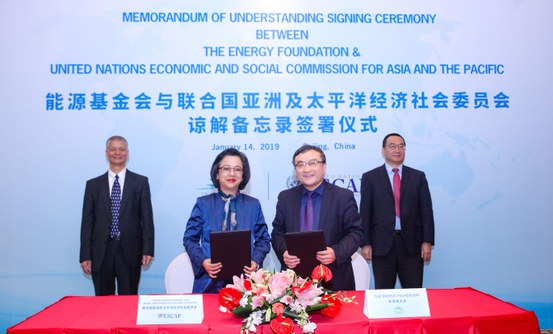ESCAP-Energy Foundation sign agreement to boost low carbon and sustainable energy targets in region

14 January 2019, Beijing – The United Nations Economic and Social Commission for Asia and the Pacific (ESCAP) and the Energy Foundation (EF) today signed a memorandum of understanding (MoU) to deepen their collaboration in promoting sustainable energy for economic development, and environmental protection in the region.
Under the agreement, ESCAP and EF will work together to support Asia-Pacific countries in accelerating implementation of the Sustainable Development Goals (SDG) 7 and 13 as well as the Paris Agreement targets. Both organizations also agreed to jointly promote opportunities to develop sustainable energy in Asia and the Pacific.
The MoU was signed by United Nations Under-Secretary-General and Executive Secretary of ESCAP Ms. Armida Salsiah Alisjahbana and the President of EF China, Professor Ji Zou in Beijing, China.
“Our organizations hold in common a wish to support countries of the region to pursue low carbon and sustainable development towards achievement of the Sustainable Development Goals (SDGs) and the Paris Agreement targets. We aim to collaborate more closely and utilize the synergies between our organizations to advance these goals,” said Ms. Alisjahbana at the signing ceremony.
“Driving clean energy goals and strengthening climate actions in the region and globally is the value that the collaboration aims to bring. With 20 years of experience working in China and in-depth knowledge on the economy-energy-environment nexus, Energy Foundation China endeavours to work with UNESCAP and support the decarbonized growth of the region,” said Zou Ji, President of Energy Foundation China.
Energy is an important entry point for many of the development challenges the region is facing. Strong economic growth, increasing population, expanding industrialization and rapid urbanization have also resulted in the Asia-Pacific facing the highest increase in energy demand globally.
Priority areas for joint activities under the agreement include renewable energy deployment, cooling energy efficiency, green finance, electric vehicles, clean and low carbon cities, and tools for SDG7 (clean energy) and SDG13 (climate action) Roadmaps in member States. Both organisations will also collaborate to enhance policy coordination, facilitate high-level policy dialogues and deliver knowledge products targeting these areas in the region.



